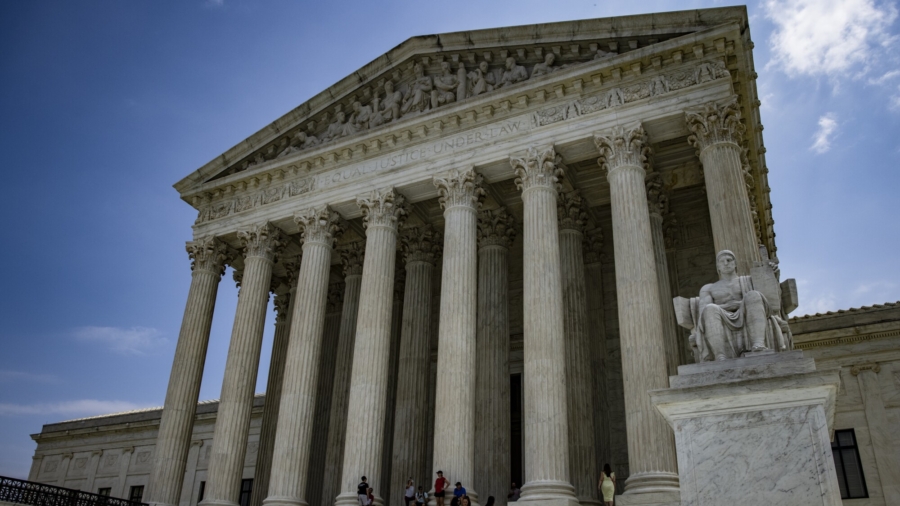The Supreme Court gave the Biden administration a green light June 30 to end the Trump-era “Remain in Mexico” policy that requires non-Mexican asylum-seekers arriving at the southern border to wait in Mexico for processing.
President Joe Biden’s decision to nix the program did not violate a 1996 migrant detention law, the court held, adding that the administration’s memorandum rescinding the program should have been examined by the lower courts.
The 5–4 opinion (pdf) in Biden v. Texas, court file 21-954, was written by Chief Justice John Roberts, and comes as record numbers of illegal aliens are streaming across the border with Mexico, overwhelming the capacity of U.S. Customs and Border Protection to deal with them.
Roberts’s opinion was joined by Justices Stephen Breyer, Sonia Sotomayor, Elena Kagan, and Brett Kavanaugh. Breyer, 83, retired from the court at Noon on June 30 and was replaced by a new justice, Biden nominee Ketanji Brown Jackson. Kavanaugh also filed a separate concurring opinion. Justices Samuel Alito and Amy Coney Barrett both filed separate dissenting opinions.
Texas and Missouri had argued that Biden broke the law by ending the program.
Upon taking office, Biden cut off enrollments in the program, part of the Migrant Protection Protocols (MPP) created by Congress when Bill Clinton was president. In 2018, the Trump administration said that it would enforce the program to crack down on the practice known as catch-and-release, in which individuals would make fraudulent asylum claims knowing they would be let into the United States and be able to stay for years before their court appearance.
Under Biden, the Department of Homeland Security (DHS) issued a memorandum on Jan. 20, 2021, saying it would “suspend new enrollments in the [MPP] pending further review of the program. Aliens who aren’t already enrolled in MPP should be processed under other existing legal authorities.”
Days later, Biden signed three new executive orders aimed at undoing Trump-era immigration policies. One of them, Biden said, “orders a full review of the previous administration’s harmful and counterproductive immigration policies, basically across the board.”
But in August 2021, at the urging of the two states, Texas-based U.S. District Judge Matthew Kacsmaryk, a Trump appointee, ordered the government to enforce the MPP policy until “lawfully rescinded.” The Biden administration had failed to properly justify ending the policy and failed to uphold a 1996 law requiring the detention of certain migrants, the judge held. The U.S. Court of Appeals for the 5th Circuit affirmed Kacsmaryk’s ruling.
On May 2, the Supreme Court took the unusual step of asking the attorneys involved in the case to provide post-hearing submissions to the court. Both the Biden administration and the two states opposing it in the high-stakes litigation filed briefs arguing the court does have the power to decide the central legal questions in the case, The Epoch Times reported.
In his new opinion, Roberts wrote that “the Government’s rescission of MPP did not violate” section 1225 of the Immigration and Nationalilty Act,” and reversed the decision of the lower court, remanding the case “for further proceedings consistent with this opinion.”
By incorrectly interpreting the section as a command, the appeals court needlessly injected itself into administration affairs and “imposed a significant burden upon the Executive’s ability to conduct diplomatic relations with Mexico,” Roberts wrote.
The district court would force the administration “to the bargaining table with Mexico, over a policy that both countries wish to terminate, and to supervise its continuing negotiations with Mexico to ensure that they are conducted ‘in good faith.’” The law does not allow the lower court “to tie the hands of the Executive in this manner,” the chief justice wrote.
In his dissent, Alito wrote that even though Congress gave the administration the option of returning “inadmissible aliens to Mexico while they await proceedings in this country,” the Biden DHS instead violated the law by releasing in the United States an “untold numbers of aliens who are very likely to be removed if they show up for their removal hearings.”
“This practice violates the clear terms of the law, but the Court looks the other way,” Alito added.
Christopher Hajec, director of litigation at the Immigration Reform Law Institute (IRLI), a nonprofit public interest law firm that filed a friend-of-the-court brief in the case, shared his views on the new ruling.
“We are certainly disappointed with the Court’s decision today,” Hajec told The Epoch Times by email.
“We think it was wrong on the merits and wrong on jurisdiction. Nevertheless, there are two silver linings. On the merits, the Court made clear that the lower courts in this case have yet to decide, and should decide, whether Biden’s extreme parole policies are lawful. We think they clearly are not. Also, on jurisdiction, the Court still left open a path for states and other parties to get relief from Biden’s disastrous immigration policies, though that path is narrower than before.”
Judy Rabinovitz, special counsel with the ACLU’s Immigrants’ Rights Project, praised the ruling.
“The Supreme Court was right to reject the spurious argument that this cruel policy is statutorily required,” Rabinovitz said in a statement.
“While, as noted in the decision, the case will return to the district court, the Biden administration can and should move forward swiftly to finally terminate ‘remain in Mexico’ for good—a result that has been long, and unjustly, delayed.”
The Epoch Times reached out to the U.S. Department of Justice for comment but did not receive a reply as of press time.
From The Epoch Times

